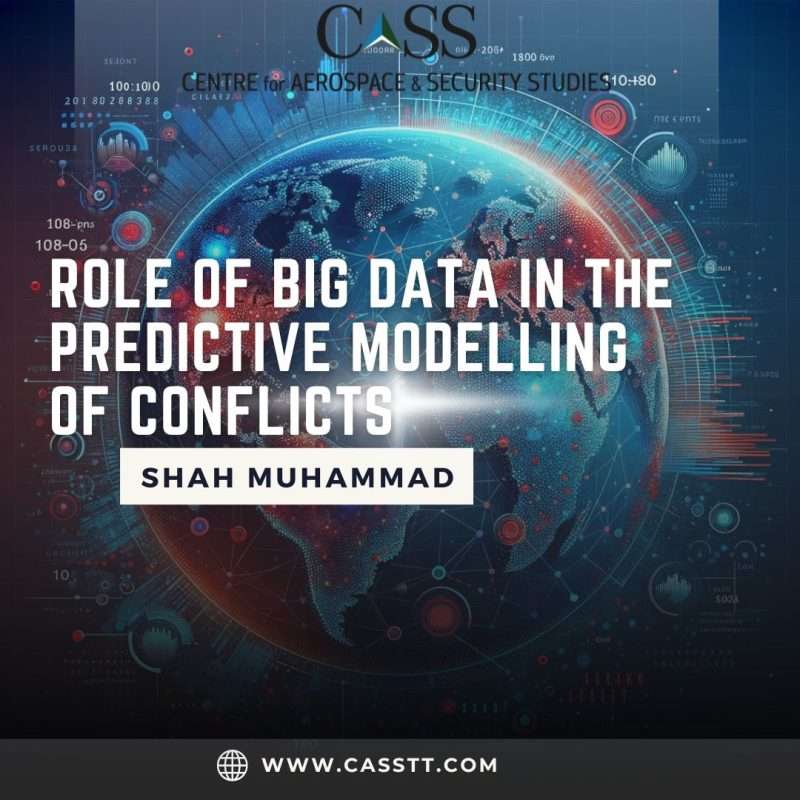Big Data is an integral domain of emerging technologies, with one of its applications being predictive modelling of future events. It consists of large volumes of data generated from multiple sources, being subjected to real-time processing and analysis through advanced systems such as Artificial intelligence (AI). Moreover, predictive modelling is a statistical technique that taps into historical and current data to predict future outcomes. For example, it can be used to predict conflicts on the basis of data-driven inputs, enabling preemptive policymaking for conflict prevention and durable peace. Hence, predictive modelling can be of relevance and significance to countries prone to various intra- or inter-state conflicts such as war, terrorism, civil strife and separatism. For example, Violence Early-Warning System (ViEWS) is a data-driven system at the Upsala University, Sweden, rendering services in this respect. Its data sets are derived from diverse thematic areas such as conflict history, governance, socioeconomic conditions and climate. Machine Learning (ML) algorithms are applied and the models are trained on the data, giving rise to predictions of conflicts and fatalities three years into the future. The system uses different ML algorithms such as random forests, gradient boosting, Markov and hurdle models.
The year 2023 was deemed one of the deadliest out of the previous four years in terms of conflict-induced fatalities. Approximately 170,000 people lost their lives globally owing to different conflicts. In this context, as pointed out earlier, Big Data systems can leverage historical and contemporary data to construct predictive models for future conflicts, offering a potential avenue for positive change and conflict prevention. ViEWS was able to predict state-based violence in Sahel region of Africa from 2018 to 2020 with 76% accuracy. In one of the latest researches, it has offered a prediction of conflicts as well as fatalities in Africa and the Middle East from April 2022 to March 2025. The team collaborated with UNHCR in 2023 to assist the latter in the development of global mapping of early warning systems for conflicts and natural hazards. Moreover, the Australian National University has developed Atrocity Forecasting Project (AFP) which predicts the occurrence of genocides a few years in advance. Its latest evaluation report rates the accuracy of 2011-2015 predictions to be around 33 to 50%. However, AFP has not yet issued evaluation reports for its recent predictions.
In the context of Pakistan, it is pertinent to situate the use of data-driven predictive modelling of conflicts for conflict prevention and national security. The country has long been affected by terrorism and extremism. Pakistan recorded a six year-high figure of approximately 1524 violence-related fatalities in 2023. Terrorism was responsible for 65% of the total fatalities, with a total of 789 terrorist incidents recorded in the same year. Predictive modelling has been explored in Pakistan with regards to natural disasters, COVID-19 mortalities and traffic incidents. As for conflicts, while there are think tanks and government departments that offer weekly, monthly and annual reports of conflict-related data, there is no indigenous system of real-time conflict mapping and predictive modelling.
There might be multiple factors impeding Pakistan’s progress in this domain. For instance, the Global Innovation Index 2023 ranks Pakistan quite low amongst a total of 132 countries in terms of technological infrastructure (120th) and human capital and research (117th). A few other challenges exist globally that may resonate with Pakistan as well. Experts have voiced concerns about the truthfulness of data and the trustworthiness of the sources which might go on to compromise data analysis. ViEWS reveals that the limited availability of data or its misrepresentation may lead to inaccurate predictions. The apprehensions of bias and ethical dilemmas are also causes of concern with regards to AI systems.
Nevertheless, tapping into the domain of Big Data for predictive modeling of conflicts is not beyond the realm of possibility for Pakistan. The Ministry of Information Technology and Telecommunication (MoITT) has crafted the Artificial Intelligence Policy that calls for the adoption of Big Data and predictive analytics in various sectors. Hence, more policies or institutional initiatives in the future may extend predictive modelling to the domain of national security and conflict prediction as well. As a way forward, cross-academia linkages with institutions like the University of Upsala could open doors for indigenous initiatives in Pakistan vis-à-vis data-driven predictive modelling of conflicts. The government, corporate sector and think tanks could also collectively promote small-scale pilot initiatives in this area. In essence, smaller strides could be stepping stones for bigger leaps in the future. These developments could go on to be instrumental for national security, conflict prevention and preemptive policymaking in the country.
To conclude, Big Data offers sophisticated tools to look into the future through data-driven predictive models. For Pakistan to adopt predictive modelling of conflicts in the future, it is imperative to have greater research, international academic linkages, and robust regulatory frameworks that prioritise ethical considerations. This may translate into a future reality where national security could be fortified through Big Data.
Shah Muhammad is a Research Assistant at the Centre for Aerospace & Security Studies (CASS), Islamabad, Pakistan. He can be reached at cass.thinkers@casstt.com.
Design Credit: Mysha Dua Salman




